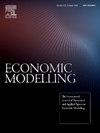Global value chains participation and pollution emissions? Theory and evidence from Chinese enterprises
IF 4.2
2区 经济学
Q1 ECONOMICS
引用次数: 0
Abstract
Participation in global value chains (GVC) is vital for economic growth and can impact environmental sustainability. This study constructs a theoretical model which incorporates enterprise's behavior of pollution emissions and uses instrumental variable regressions to examine the environmental effects of GVC integration on enterprises. Specifically, this paper employs micro-level data from China for empirical analysis and measures the degree of enterprise's embedding in GVC. Our results indicate that deeper GVC integration reduces both pollution emissions and intensity. Besides, GVC participation can affect enterprise's pollution emission through abatement investment effect, technical effect and scale effect. While GVC participation may increase emissions due to higher production, it enhances technological capabilities and investment in pollution control, which reduces net emissions. Furthermore, since energy efficiency is another important aspect of enterprise's environmental performance, we also examine the relationship between GVC integration and energy efficiency. We find that GVC integration improves enterprises' energy efficiency, underscoring its positive ecological impact. Overall, GVC participation promotes sustainable practices, indicating that it is a strategic approach for enterprises seeking to balance economic and environmental goals. As GVC participation continues to expand globally, its influence on fostering sustainable industrial practices will become increasingly significant, making it a crucial area for future research and policy development.

求助全文
约1分钟内获得全文
求助全文
来源期刊

Economic Modelling
ECONOMICS-
CiteScore
8.00
自引率
10.60%
发文量
295
期刊介绍:
Economic Modelling fills a major gap in the economics literature, providing a single source of both theoretical and applied papers on economic modelling. The journal prime objective is to provide an international review of the state-of-the-art in economic modelling. Economic Modelling publishes the complete versions of many large-scale models of industrially advanced economies which have been developed for policy analysis. Examples are the Bank of England Model and the US Federal Reserve Board Model which had hitherto been unpublished. As individual models are revised and updated, the journal publishes subsequent papers dealing with these revisions, so keeping its readers as up to date as possible.
 求助内容:
求助内容: 应助结果提醒方式:
应助结果提醒方式:


